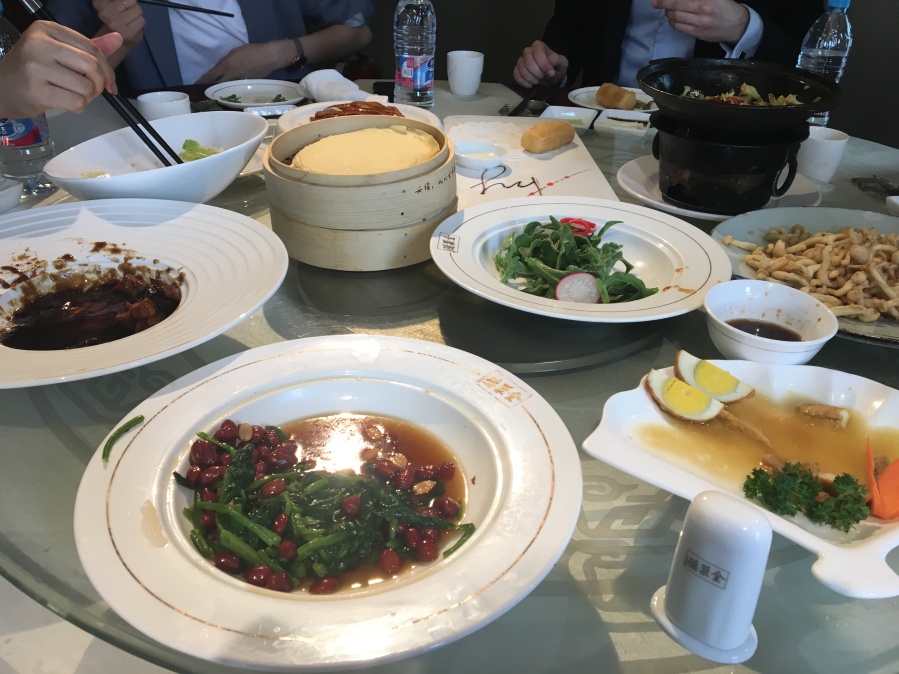First, some background. This is a blog about my summer internship at the Carnegie-Tsinghua Center at Beijing. Obviously, it’s going to be about a lot more than just my work. As a Hong Kong-er, everything about Mainland China is clouded by a shroud that is a healthy mixture of (sometimes warranted) resentment and (sometimes unfounded) prejudice. Much like the legendary Beijing smog – more on that later.
Growing up in Hong Kong with Mainland Chinese parents, I was exposed to a kaleidoscope of contradicting visions of China. My mother’s father was coerced to the point of suicide by the Red Guards,[1] and she was sent to the countryside to be “re-educated” when she was a child. She has a pathologically negative view about the Mainland and everything to do with it. E.g. She insisted on me bringing shampoo and toothpaste from Hong Kong because those in the Mainland are “way worse”. My father, on the other hand, is the embodiment of cognitive dissonance. The government took away the family wealth, and he had to work his way up from the bottom. However, as a testament to the power of propaganda, he still loves the Chinese government, and remains a fervent nationalist. Like many Chinese people, this nationalism is tempered with a paradoxical admiration for the West – he would sing praises about life in China and brag about any relative who managed to “make it” to the US in the same breath. Combine these inherited visions of China with my experience of growing up in Hong Kong, and you have a larger-than-life spectre of modern China.
I was definitely a bit apprehensive when I decided to “do” [2] this internship. I was never at ease with my own Chinese-ness. It’s the little things that matter – I have a funny accent in Mandarin; I can’t use the squatting toilets etc.[3] Nationality, in the Mean Girls “you can’t sit with us” sense of the word, needs both sides to agree on your in/out status. I’m curious about how people would see me – would they see me as a foreigner, or would they see me as an out-of-touch Chinese person?
It also doesn’t help that I don’t know Beijing that well at all. On my first day in Beijing, I messaged the intern group suggesting we get dinner. What ensued was a flood of food recommendations from the group – who were all foreigners. Part of me was grateful that I had a list of decent places to go to; another part was slightly ashamed that I needed foreigners to show me around a city that I’ve been to at least a dozen times.[4] One such place was apparently a famous stall that sold date cakes by the kilo for 10 RMB – pictures below. During dinner, they talked about prominent areas in Beijing that I’ve never heard of. “I’m going to be shown around Beijing by white people”, I thought.

I know it’s an orientalist cliché to say “oh the people were LOVELY/BEAUTIFUL”, but they really were. Locals thus far have been extra nice when they see me struggle with Chinese, but are puzzled about why I didn’t learn Mandarin better since both my parents speak it. The office took us out for a nice welcome lunch on our first day, and the pictures speak for themselves.
It’s too early to tell how I’ll fit in/not fit in – that’s what this blog is for. There have already been a few incidents that put my identity under scrutiny. I suspect I will never truly be able to be ‘in’ as a local Chinese, but in this era of collapsing binaries, maybe I can learn to be comfortable in my in-betweeness, being both in and not.
[1] Militant supporters of Mao (some would take issue with this description) that caused great turmoil during the Cultural Revolution.
[2] Incidentally, what is a more eloquent way of saying “to do” an internship? I’ve spent way too much time puzzling over the problem when writing cover letters. To “undertake” an internship sounds obnoxious. To “do” an internship sounds too blasé. What is a happy medium?
[3] The issue of squatting versus sitting toilets is worthy of an essay in and of itself. From a hygienic standpoint, squatting is way more hygienic than sitting; ironically, sitting toilets are seen as a sign of modernization and progress. I was also surprised to find out that squatting toilets used to be common in France, while the popular narrative usually associates them with China. Squatting also makes for more efficient defecation, and there is now a stool (pun intended) that you can purchase to simulate squatting on a sitting toilet. The ad for it is one of the most bizarre commercials I’ve ever seen. A final thought on this issue – I think squatting toilets are a great way to prevent procrastination at work. I will spend a lot less time on my phone in a cubicle if I feel like my knees are about to give in at any second. http://www.dailymail.co.uk/health/article-3742997/The-great-sit-squat-debate-idea-fills-horror-squat-toilets-effective-better-health-doctor-claims.html
[4] The problem with that is we only go back to see family. My knowledge of Beijing is almost non-existent save for the few famous restaurants that my relatives would take us to.




